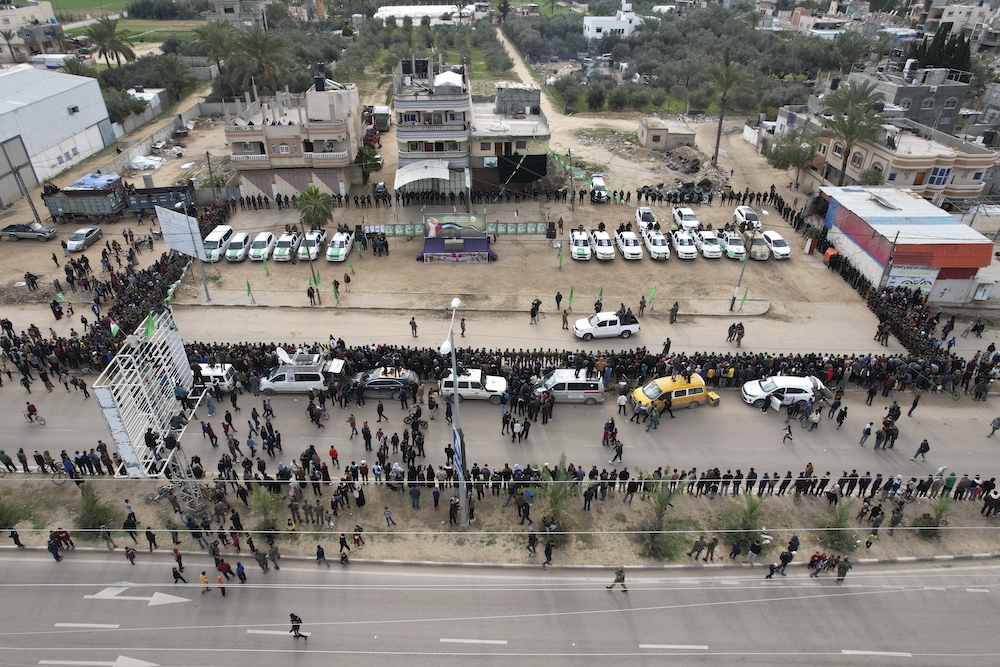DEIR EL-BALAH, Palestinian Territories: Israel and Hamas completed their fifth hostage-prisoner swap under a fragile Gaza ceasefire deal on Saturday, with the frail, disoriented appearance of the three freed Israelis sparking dismay among their relatives.
Out of the 183 inmates released by Israel in return, the Palestinian Prisoners’ Club advocacy group said seven required hospitalization, decrying “brutality” and mistreatment in jail.
The fifth exchange since the truce took effect last month comes as negotiations were set to begin on the next phase of the ceasefire, which should pave the way for a permanent end to the war.
FASTFACT
The Hostage and Missing Families Forum urged the Israeli government on Friday to stick with the ceasefire.
Or Levy, Ohad Ben Ami, and Eli Sharabi, who were all seized by militants during the Oct. 7, 2023 attack that sparked the war, “crossed the border into Israeli territory” on Saturday, the Israeli military said.
With their return, 73 out of 251 hostages taken during the attack now remain in Gaza, including 34 the Israeli military says are dead.
Jubilant crowds in Israel’s commercial hub, Tel Aviv, cheered as they watched live footage of the three hostages, flanked by masked gunmen, brought on stage in Deir El-Balah before being handed over to the International Committee of the Red Cross.
But the joy at their release was quickly overtaken by concern for their condition, with all three appearing thin and pale.
Sharabi’s cousin Yochi Sardinayof said “he doesn’t look well.”
“I’m sure he will now receive the right treatment and get stronger ... He has an amazing family, and we will all be there for him.”
The choreographed handover included forced statements from the three on stage, in which they stated support for finalizing the subsequent phases of the Israel-Hamas truce.
Sharabi, 52, and Ben Ami, a 56-year-old dual German citizen, were both abducted from their homes in kibbutz Beeri when militants stormed the small community near the Gaza border.
Sharabi lost his wife and two daughters in the attack.

Palestinians gather around a stage being prepared ahead of the hand over to the Red Cross of three Israeli hostages by Hamas in Deir Al-Balah, central Gaza Strip on Feb. 8, 2025. (AP)
Levy was abducted from the Nova music festival, where gunmen murdered his wife.
In the occupied West Bank city of Ramallah, the seat of the Palestinian Authority, relatives and supporters gathered to welcome inmates released by Israel, embracing them and cheering as they stepped off the bus that brought them from nearby Ofer prison.
Israel’s prison service said that “183 terrorists ... were released” to the West Bank, annexed East Jerusalem and Gaza.
The Palestinian Prisoners’ Club advocacy group and the Palestinian Red Crescent said that seven of them had been admitted to hospital in the West Bank.
“All the prisoners who were released today need medical care ... as a result of the brutality they were subjected” to in jail, said the advocacy group, which has long decried abuses of Palestinians in Israeli custody.
Hamas, in a statement, accused Israel of “systematic assaults and mistreatment of our prisoners,” calling it “part of the policy of ... the slow killing of prisoners.”
Gaza militants have so far freed 21 hostages in exchange for hundreds of mostly Palestinian prisoners released from Israeli jails.
Five Thai hostages freed last week from Gaza were discharged on Saturday from a hospital in central Israel, where they had been treated since their release, and were headed back to their home country.
The ceasefire aims to secure the release of 12 more hostages during its first 42-day phase.
Negotiations on the second stage of the ceasefire were set to begin on Monday, but there have been no details on the status of the talks.
The Hostage and Missing Families Forum urged the Israeli government on Friday to stick with the truce.
“An entire nation demands to see the hostages return home,” the Israeli campaign group said in a statement.
“Now is the time to ensure the agreement is completed — until the very last one,” it added.
Netanyahu’s office said that after Saturday’s swap, an Israeli delegation would head to Doha for further talks.
Israel’s offensive has killed at least 48,181 people in Gaza, the majority civilians, according to the territory’s Health Ministry. The UN considers the figures reliable.
The confirmed number of dead published by the ministry has continued to rise daily as bodies are discovered under the rubble, victims are identified or people die from wounds sustained earlier in the war.
Over the last 48 hours, 26 deaths have been recorded and more than 570 earlier deaths had been confirmed, according to the ministry.
It said a total of 111,638 people have been wounded during the war, which began in October 2023.
A study published in early January in the British medical journal The Lancet estimated the death toll in Gaza due to hostilities during the first nine months of the war was about 40-percent higher than the figures recorded by the Gaza Health Ministry.





























